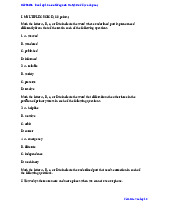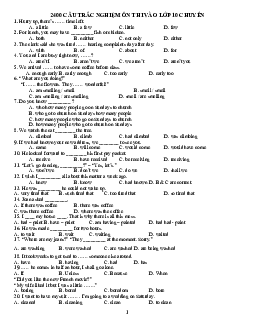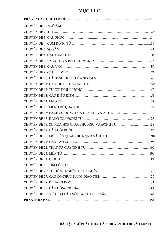












Preview text:
Câu bị động - Passive Voice và bài tập nâng cao có đáp án Ôn thi vào 10
1. Định nghĩa câu bị động
- Câu bị động được dùng khi muốn nhấn mạnh đến đối tượng chịu tác động của hành
động hơn là bản thân hành động đó. Thì của động từ ở câu bị động phải được chia theo
thì của động từ ở câu chủ động. - Ví dụ:
The cake is made by my little brother (Chiếc bánh này được làm bởi em trai của tôi)
Trong câu này, tác giả muốn truyền đạt nhấn mạnh hành động chiếc bánh này được làm
bởi em trai. Câu bị động ở đây có vai trò tuyên dương, trân trọng hành động của của người thực hiện.
2. Điều kiện biến đổi câu bị động:
- Động từ (verb) trong câu chủ động phải là Transitive Verb (ngoại động từ phải có tân ngữ phía sau) 3. Cấu trúc:
Lưu ý: “be” chia theo thì của động từ
4. Quy tắc biến đổi câu bị động:
- Xác định thành phần trong câu: Chủ ngữ (S)? Động từ (V)? Tân ngữ (O)?
- Xác định thì của động từ chính
- Lấy O trong câu chủ động làm S cho câu bị động. Lấy S trong câu chủ động làm O và
đặt sau By trong câu bị động.
- Biến đổi V chính trong câu chủ động thành P2 (Past Participle) trong câu bị động.
- Thêm To be vào trước P2 trong câu bị động (To be phải chia theo thời của V chính
trong câu chủ động và chia theo số của S trong câu bị động)
5. Bảng công thức các thì phổ biến trong câu bị động: Tense (thì) Chủ động (Active) Bị động (Passive) 1. The present simple (Thì S + V (s/es) + O
S + am/ is/ are + PII + (by O) hiện tại đơn) 2. The present continuous S + am/ is/ are + V-ing + O
S + am/ is/ are + being + PII + (by O)
(Thì hiện tại tiếp diễn) 3. The present perfect (Thì S + have/ has + PII + O
S + have/ has + been + PII + (by O) hiện tại hoàn thành) 4. The present perfect
S + have/ has + been + being + PII + continuous (Thì hiện tại S + have/ has + been + V-ing (by O) hoàn thành tiếp diễn) 5. The simple past (Thì quá S + V-ed + O S + was/ were + PII + (by O) khứ đơn) 6. The past continuous (Thì S + was/ were + V-ing
S + was/ were + being + PII + (by O) quá khứ tiếp diễn)
7. The past perfect (Thì quá S + had + PII + O S + had been + PII + (by O) khứ hoàn thành) 8. The past perfect continuous (Thì quá khứ S + had + been + V-ing + O
S + had + been + being + PII + (by O) hoàn thành tiếp diễn) 9. The simple future ( Thì S + will/ shall + V + O
S + will/ shall be + PII + (by O) tương lai đơn) 10. The simple continuous
S + will/ shall + be + being + PII +
S + will/ shall + be + V-ing + O
(Thì tương lai tiếp diễn) (by O) 11. The simple future
S + will/ shall + have + been + PII +
perfect (Thì tương lai hoàn
S + will/ shall + have + PII + O (by O) thành) 12. The near future (Thì S + be going to + V + O
S + be going to + be + PII + (by O) tương lai gần) 13. Modal verbs (can, could, should, shall, may, S + Modal + V-bare Inf + O S + Modal + be + PII + (by O) might, must,…)
6. Các dạng câu bị động
a. Bị động với những động từ có 2 tân ngữ: Những động từ có hai tân ngữ thường là
give (đưa), lend (cho mượn), send (gửi), ….
Ví dụ: I send her a letter (Tôi gửi cho cô ấy một bức thư) O1 O2 => A letter is sent to him
=> He is sent a letter by me
b. Bị động với các động từ tường thuật
- Các động từ tường thuật gồm: assume, believe, claim, expect, feel, find, know, say,… - Cấu trúc:
Chủ động: S1 + V1 (tường thuật) that S2 + V2
Bị động: S1 + be + PII + to V2
It + be + PII + that + S2 + V2
- Ví dụ: People say she is very smart
=> She is said to be very smart
=> It’s said that she is very smart
c. Câu chủ động là câu nhờ vả: với các động từ have, get, make
- Have sb do st => have st done
Ví dụ: Thomas has his son buy a cup of coffee.
→ Thomas has a cup of coffee bought by his son.
- Make sb do st => St + be made + to V + (by sb)
Ví dụ: Suzy makes the hairdresser cut her hair.
→ Her hair is made to cut by the hairdresser.
- Get + sb + to V +st => get + st + PII + (by sb)
Ví dụ: Shally gets her husband to clean the kitchen for her.
→ Shally gets the kitchen cleaned by her husband.
7. Bài tập câu bị động:
Exercise 1: Turn these sentences into passive
1. Tom will visit his parents next month
2. Her mother is preparing the dinner in the kitchen
3. She will have Peter wash her car tomorrow
4. My father waters this flower every morning.
5. John invited Fiona to his birthday party last night
6. They are pulling down the old theatre
7. The organizers will exhibit the paintings till the end of the month
8. The burglars had cut an enormous hole in the steel door
9. People must not leave their bikes in the hall
10. Someone repaired her car yesterday
11. The teacher always welcomes new students.
12. People speak English all over the world.
13. Thomas Edison invented the phonograph in 1877.
14. The police found two children in the forest.
15. They will send your order as soon as possible.
16. The scientists are studying the problem carefully.
17. Pat Murphy was riding the horse.
18. The police have just arrested the robbers.
19. Sue told us she had born her baby.
20. They can use this room after 5 p.m.
Exercise 2: Turn these sentences into passive
1. Do they teach English here?
2. Will you invite her to your wedding party? 3. Has Tom finished the work?
4. Did the teacher give some exercises?
5. Have they changed the window of the laboratory?
6. What books are people reading this year?
7. How did the police find the lost man?
8. Who look after the children for you?
9. How long have they waited for the doctor?
10. What time can the boys hand in their papers?
Exercise 3: Give the correct form of words in following sentences
1. Toshico had her car (repair) .............. by a mechanic.
2. Ellen got Marvin (type) ..................her paper.
3. We got our house (paint) .................. last week.
4. Dr Byrd is having the students (write ) ................... a composition.
5. Mark got his transcripts (send)................... to the university.
Exercise 4: Rewrite each sentence so that it contains the word capitals
1. Candidates may not use the dictionaries (BY)
2. People said that the President was killed by a mad man (IT)
3. I didn’t realize that someone was recording our conversation (BEING)
4. They asked me some difficult questions at the interview (I)
5. I am going to move my things next week (BE)
Exercise 5: Turn these sentences into passive
1. They have her tell the story again
2. John gets his sister to clean his shirt
3. Anne had had a friend type her composition
4. Rick will have a barber cut his hair
5. I will get the dressmaker to make a new dress
6. He had a mechanic repair his car
7. She often gets the technician to maintain the heater
8. People consider that she was the best singer that Australia has ever produced.
9. It is expected that the weather will be good tomorrow.
10. A lot of people believe that the Prime Minister and his wife have separated.
Exercise 6: Write the sentences in Passive voice using an appropriate tense
1. A well-know architect built those skyscrapers.
2. He didn’t freeze the vegetables
3. My manager will visit this place
4. I redecorate my room every summer
5. The car mechanic repaired his broken car
6. My girlfriend will wear a short-length dress
7. Coldplay sang five wonderful songs
8. My dog ate a bone yesterday
Exericse 7: Choose the best answer
1. Children tend to ____________ by the violence at home and at school. A. negatively affect B. be negatively affected C. negatively affecting D. be negatively affecting
2. According to our teacher, John's essay ____________ to be the best one in the recent competition. A. considered B. was considering C. considers D. was considered
3. The New York Times, one of the most famous newspapers in the world, ____________ online now. A. is published B. was published C. published D. publishes
(Đề thi Tuyển sinh lớp 10 môn Tiếng Anh tỉnh Bà Rịa Vũng Tàu năm 2017-2018)
4. Animals ____________ to survive in the wild, rather than kept in captivity. A. are helping B. could be helping C. should be helped D. have been helping
5. It is true that happiness ____________ with money, but much money ____________ life easier. A. mustn’t be bought - made B. can’t be bought - makes C. should buy - makes
D. doesn’t buy – is making
6. The film ____________ at the beginning of the next month. A. is going to release B. is releasing C. is going to be released D. will release
7. We ____________ by the annoying sound near our house. A. were waken B. was waking C. were waking D. were awake
8. A few days ago, Tom's car ____________ by one of the teenagers in my neighbourhood. A. were stolen B. was stealing C. were stealing D. was stolen
8. Đáp án bài tập câu bị động
Exercise 1: Turn these sentences into passive
1. Tom’s parents will be visited (by him) next month
2. The dinner is being prepared (by her mother) in the kitchen
3. She will have her car washed tomorrow.
4. This flower is watered (by my father) every morning
5. Fiona was invited to John’s birthday party last night
6. The old theatre is being pulled down
7. The paintings will be exhibited till the end of the month
8. An enormous hole in the steel door had been cut by the burglars
9. Their bikes must not be left in the hall
10. She had her car repaired yesterday
11. New students are always welcomed by the teacher.
12. English is spoken all over the world.
13. The phonograph was invented by Thomas Edison in 1877.
14. Two children were found in the forest by the police.
15. Your order will be sent as soon as possible.
16. The problem is being studied carefully by the scientists.
17. The horse was being ridden by Pat Murphy.
18. The robbers have just been arrested by the police.
19. We were told that Sue had born her baby.
20. This room can be used after 5 p.m.
Exercise 2: Turn these sentences into passive 1. Is English taught here?
2. Will she be invited to your wedding party?
3. Has the work been finished by Tom?
4. Were some exercises given by the teacher?
5. Has the window of the laboratory been changed?
6. What books are being read this year?
7. How was the lost man found by the police?
8. By whom are the children looked after for you?
9. How long has the doctor been waited for?
10. What time can their papers be handed in by the boys?
Exercise 3: Give the correct form of words in following sentences
1. Toshico had her car (repair) ....repaired.......... by a mechanic.
2. Ellen got Marvin (type) ..........to type........her paper.
3. We got our house (paint) .......painted........... last week.
4. Dr Byrd is having the students (write ) .......write............ a composition.
5. Mark got his transcripts (send)........cut........... to the university.
Exercise 4: Rewrite each sentence so that it contains the word capitals
1. The dictionaries are not used by candidates
2. It was said that the President was killed by a mad man
3. I didn’t realize that our conversation is being recorded
4. I was asked some difficult questions at the interview
5. My things are going to be moved next week
Exercise 5: Turn these sentences into passive 1. They have the story again
2. John gets his shirt cleaned
3. Anne has had her composition typed
4. Rick will have his hair cut
5. I will get a new dress made 6. He had his car repaired
7. She often gets the heater maintained
8. She is considered to have been the best singer that Australia has ever produced.
9. The weather is expected to be good tomorrow.
10. The Prime Minister and his wife are believed to have separated.
Exercise 6: Write the sentences in Passive voice using an appropriate tense
1. Those skycrapers were built by a well-known architect
2. The vegetables weren’t frozen
3. This place will be visited by my manager
4. My room is redecorated every summer
5. His broken car was repaired by the car mechanic
6. A short-length dress will be worn by my girlfriend
7. Five wonderful songs were sung by coldplays
8. A dog was eaten by my dog yesterday
Exericse 7: Choose the best answer 1. B 2. D 3. A 4. C 5. B 6. C 7. A 8. D



